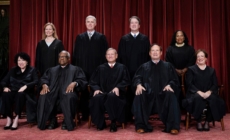-
‘Shut down the Blue Jays’ offense’ – Derek Jeter on how Yankees can overcome 0-2 deficit in ALDS - 8 mins ago
-
Gaza ceasefire negotiations to resume amid new hope for peace deal - 20 mins ago
-
Threats to TikTok workers are traced to L.A. man; standoff follows - 24 mins ago
-
McLaren boss makes strong statement on Norris-Piastri contact - 34 mins ago
-
Ja'Marr Chase makes incredible TD grab as Bengals close gap on Lions - 50 mins ago
-
Kyle Busch Breaks Silence on Crew Chief Change Amid Performance Slump - about 1 hour ago
-
George Springer's 20th career playoff home run increases Blue Jays' lead over Yankees - 2 hours ago
-
Amy Schumer, 44, shows off impressive weight loss on social media - 2 hours ago
-
Supreme Court Kicks Off New Term: What to Know - 2 hours ago
-
Priscilla strengthens into a hurricane in the Pacific. Maps show its path. - 2 hours ago
Supreme Court Kicks Off New Term: What to Know
The Supreme Court’s new term starts on Monday with six cases slated for argument this week.
Why It Matters
The Court is set for oral arguments amid a moment of heightened political violence and polarization in the country, and just days after the individual who sought to assassinate Justice Brett Kavanaugh in 2022 received an eight-year jail sentence.
The session also comes shortly after a new Gallup poll found that over 40 percent of Americans, an all-time high, say the Court is “too conservative.” The Court currently has a 6-3 conservative majority and has ruled in favor of the Trump administration on many key issues, including immigration enforcement and cuts at federal government agencies. Over a dozen emergency requests from the Trump administration have been granted by the Court last term.
Despite the Court’s conservative majority, the justices ruled unanimously in 42 percent of cases decided last term. In 2023, they ruled unanimously in 44 percent of cases, and in 2022, the rate was 50 percent.
What To Know
On Monday, the Court will begin with oral arguments in Villareal v. Texas. The case presents the question of whether a trial court violates a defendant’s Sixth Amendment right to counsel when prohibiting the defendant and their counsel from discussing the defendant’s testimony during an overnight recess.
At the center of the case is David Asa Villarreal, who was charged with murder in Texas, and began his direct examination ahead of an adjournment. He resumed testimony the next day and later was convicted and sentenced to 60 years in prison. His legal team then appealed the decision, arguing his Sixth Amendment right to counsel was violated.
Following that case, the Court will hear arguments in Berk v. Choy, which is concerned with whether federal courts must apply a Delaware state law requiring plaintiffs in medical negligence cases to submit an affidavit of merit (AOM) in their filing. Harold Berk, who alleges negligent medical care from three providers, did not submit an AOM, and his case was dismissed by a federal court.
Justices will hear arguments in Chiles v. Salazar and Barrett v. United States on Tuesday. The former is concerned with Colorado’s ban on LGBTQ+ conversion therapy, with counselor Kaley Chiles having challenged the state law, arguing it violates the First Amendment.
In Barrett, the Court will decide whether the Fifth Amendment’s double jeopardy clause allows separate sentences for the same gun use under U.S. Code § 923 Sections 924(c) and 924(j).
The final two cases of the week will be Bost v. Illinois Board of Elections and Postal Service v. Konan. Bost is concerned with whether federal candidates, in this case Representative Mike Bost, an Illinois Republican, can sue to challenge Illinois’s law that allows mail ballots postmarked by Election Day to be counted for up to 14 days afterward. The question before the Court is whether candidates have Article III standing to even bring the suit.
The case has brought together support from across the political spectrum, as the American Civil Liberties Union (ACLU), who states online that they “strongly opposes Congressman Bost’s position on the merits,” filled an amicus brief backing his standing, arguing that similar challenges would “apply to civil rights groups when they bring suit to expand or protect the rights of voters.”
Finally, in Postal Service, the Court will decide whether a claim that USPS employees intentionally refused to deliver mail to a designated address falls within the Federal Tort Claims Act’s postal exception of “arising out of the loss, miscarriage, or negligent transmission of letters or postal matter.”
What People Are Saying
Jim Campbell, chief legal counsel at Alliance Defending Freedom, which is representing Chiles, told Newsweek on Friday that the government has “has no business censoring private conversations between clients and counselors. “Colorado’s law harms these young people by depriving them of caring and compassionate conversations with a counselor who helps them pursue the goals they desire.”
Colorado Attorney General told Newsweek on Friday about Chiles v. Salazar that the Court should “adhere to its long line of precedents and affirm the states’ power to regulate health care and protect kids and families from substandard practices. To do otherwise would not only create immediate harm to those who are forced to undergo this discredited practice but would also open the door to a range of challenges to regulatory oversight of licensed professionals who harm patients or consumers through other practices that violate accepted and appropriate standards of care.”
The American Civil Liberties Union (ACLU) writes on its website about Bost v. Illinois Board of Elections: “We argue that the standing rules should be the same for candidates, civic groups, and numerous other plaintiffs in a variety of contexts—and that, under the right standard, the courthouse door should be open to Congressman Bost in this case and to the League in the cases that it brings based on similar injuries.”
What Happens Next
Session will start on Monday and justices will hear oral arguments through the Spring.
Source link































